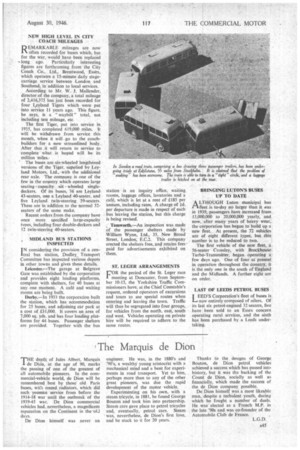The Marquis de Dion
Page 47

If you've noticed an error in this article please click here to report it so we can fix it.
THE death of Jules Albert, Marquis de Dion, at the age of 90, marks the passing of one of the greatest of all automobile pioneers. In the commercial-vehicle world, de Dion will be remembered best by those old Paris buses, with round radiators, which did such yeoman service from before the 1914-18 war until the outbreak of the 1939-45 war. De Dion commercial vehicles had, nevertheless, a magnificent reputation on the Continent in the old days.
De Dion himself was never an engineer. He was, in the 1880's and '90's, a wealthy young aristocrat with a mechanical mind and a bent for experiments in road transport. Yet to him, perhaps more than to any of the other great pioneers, was due the rapid development of the motor vehicle.
Experimenting on his own, with a steam tricycle, in 1881. he found George Bouton and took him into partnership. Steam cars gave place to petrol tricycles and, eventually, petrol cars. Steam was, nevertheless. de Dion's first love. and he stuck to it for 20 years.
Thanks to the designs of George Houton, de Dion petrol vehicles achieved a success which has passed into history, but it was the backing of the Count de Dion. socially as well as financially, which made the success of the de Dion company possible.
De Dion himself was a most likeable man, despite a turbulent youth, during which he fought a number of duels. He was• elected as a French M.P. in the late '90s and was co-founder of the Automobile Club de France.




































































